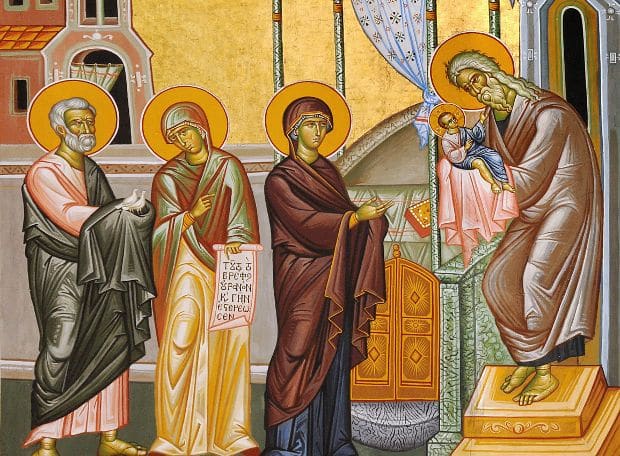Despotic holiday of Christianity, commemorating the bringing of the little Christ by his parents (the Virgin and Joseph) to the temple of Jerusalem and his reception by the presbyter priest Simeon, the Epiphany of the Lord is celebrated on February 2, together with the memory of the event of the purification of the Virgin Mary from the plague (sarandism).
The Epiphany of the Lord is one of the twelve great feasts of the Orthodox Christian Church (Dodecaorton).
The word Ypapanti means pre-answer in common Hellenistic. On February 2, Ypapanti, Panagiotis, Maria and Despoina have their name feast.
The ecclesiastical event of the Presentation of the Lord, narrated by the Evangelist Luke (b, 22-38), happened forty days after the birth of Jesus.
Because, according to the Mosaic law, he was the first child in the family, and even a boy, he had to be dedicated to God and at the same time the parents had to offer Him a small sacrifice of a pair of turtledoves or two young pigeons.
The couple of Joseph and Mary was preceded in the temple by the elderly Simeon, who received Jesus in his arms, which was illuminated by the Holy Spirit.
The elder priest had received a promise from God that he would not die, before he saw Christ and thanked Him with the words:
Now you dismiss your slave, Despot according to your word in peace,
that my eyes have seen your salvation,
what you have prepared in the face of all the peoples,
light to the revelation of nations and glory to your people Israel.
Initially, Hypapanti was celebrated in the Byzantine world on February 14.
It was a rather minor religious holiday, reduced to a despotic one by the emperor Justinian in 542 and forced to be celebrated on February 2nd, in order to ask the intercession of the Lord for a plague that had invaded his territory.
Today, only the Armenian Church celebrates Ypapanti on February 14, while those Christians who follow the Julian Calendar (old calendarists) celebrate Ypapanti on February 15.
The Epiphany of the Lord is celebrated with particular splendor in Kalamata, where the church of the same name celebrates.
Religious events begin on January 27 and end on February 9.
On the day of Panagia Papanti, the millers of Crete are late.
They honor Panagia Myliargousa, whom they have as their patron.
Farmers also observe the holiday so that hail does not fall and destroy the vegetation.
The meteorological proverbs of the day are also characteristic: "Papanti's summer, March winter" and "Whatever Papanti's weather does, forty days will do it".
Source: in.gr
